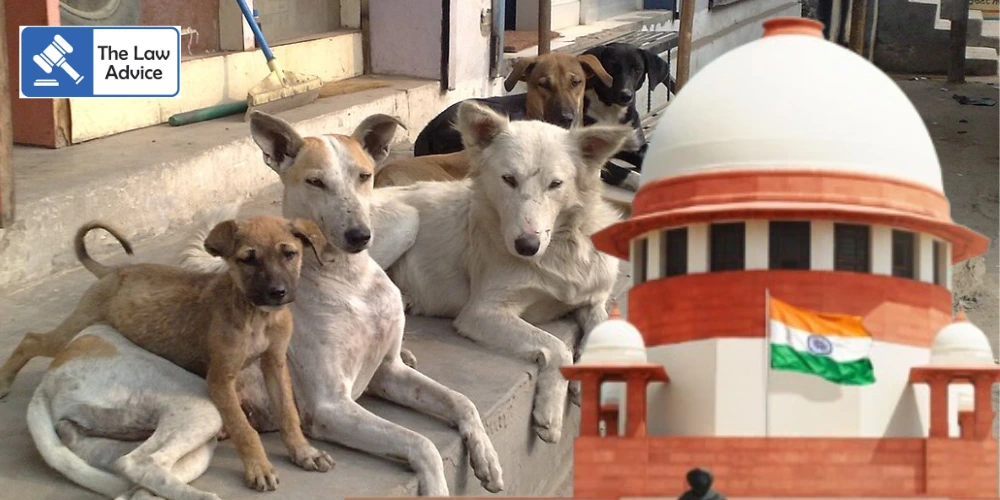The Supreme Court on August 14, 2025 reserved its order on a plea seeking to stay the implementation of sweeping directions issued by a two-judge bench on August 11, which mandated the immediate removal of stray dogs from Delhi-NCR to shelter homes.
The matter was heard by a newly assigned three-judge bench comprising Justice Vikram Nath, Justice Sandeep Mehta, and Justice NV Anjaria, after concerns were raised that the August 11 order conflicted with previous Supreme Court rulings on stray dog management.
The case — a suo motu matter titled In Re: ‘City Hounded by Strays, Kids Pay Price’ [SMW(C) No. 5/2025] — was initially being heard by a two-judge bench of Justice JB Pardiwala and Justice R Mahadevan. That bench had taken cognisance of a news report on July 28 highlighting incidents of children being attacked by stray dogs in Delhi and had issued directions on August 11 calling for immediate large-scale removal and housing of stray dogs.
At the outset, Solicitor General Tushar Mehta, representing the Government of NCT of Delhi, cited alarming statistics: approximately 37 lakh dog bites occur annually in India — averaging 10,000 bites per day — with 20,000 rabies deaths every year according to WHO data.
“Sterilisation does not stop rabies. Even if dogs are immunised, they can still mutilate children,” Mehta argued, stressing that public safety must take precedence. Drawing an analogy, he said:
“Only four or five species of snakes are poisonous, but we don’t keep them at home. Nobody is saying kill dogs — they need to be separated. Kids are not able to play outside or go to school.”
Senior Advocate Kapil Sibal, representing Project Kindness, countered that the August 11 order bypassed Animal Birth Control (ABC) Rules and existing parliamentary legislation, which mandate sterilisation and vaccination, not mass removal.
Sibal pointed out that the Municipal Corporation of Delhi (MCD) had failed to build adequate shelter homes or conduct large-scale sterilisation, leading to a growth in stray dog numbers.
He urged the Court to stay directions 1, 3, 4, and 5 of the August 11 order, warning:
“When there is not enough space in shelters, dogs attack each other, causing pestilence — which can also affect humans. If they don’t sterilise or immunise, dogs will multiply.”
He further sought a direction to release dogs already picked up in compliance with the August 11 order.
Other Senior Advocates Flag Legal & Practical Concerns
• Dr Abhishek Manu Singhvi argued that at least six previous Supreme Court orders had expressly disapproved of mass capture and had directed strict adherence to ABC Rules — which the August 11 order ignored.
• Siddharth Dave submitted that the order was passed solely based on submissions from the Solicitor General and the amicus curiae, without hearing animal rights groups.
• Aman Lekhi contended the directions were based on anecdotal reports and unauthenticated videos.
• Colin Gonsalves stressed that sterilisation and feeding programmes are proven methods to reduce stray populations.
• Krishnan Venugopal noted that Delhi-NCR has an estimated 1 million stray dogs, but existing shelter capacity is only about 1,000.
When these arguments were presented, Justice Sandeep Mehta observed that many of the statements themselves were “anecdotal” and pressed for concrete evidence.
Turning to Additional Solicitor General Archana Pathak Dave for the MCD’s stand, Justice Vikram Nath remarked:
“This is happening because of the inaction of the Municipal Corporation. The Government does nothing. The local authorities do nothing.”
The Bench noted that several aspects of the stray dog issue were the direct result of years of neglect by responsible civic bodies.
The August 11 Directions Under Challenge
The two-judge bench’s order had called for:
1. Immediate creation of dog shelters across Delhi within 8 weeks, with personnel to care for sterilised and immunised dogs, monitored by CCTV.
2. Initial capacity for 5,000 dogs, with MCD/NDMC/Delhi Govt starting to pick up strays from all areas, prioritising vulnerable localities.
3. Maintenance of daily records of captured dogs, with strict prohibition on releasing any stray back onto the streets.
4. A helpline for dog-bite cases, with a requirement to capture the dog within 4 hours of a complaint, followed by sterilisation and immunisation.
5. Public disclosure of vaccine stock and availability.
The order also warned of contempt proceedings against individuals or organisations obstructing implementation.
The three-judge bench has now reserved its order on whether to stay these directions until the matter is fully adjudicated. The case will likely determine the balance between public safety concerns and animal welfare laws, as well as the responsibility of municipal bodies to implement existing stray dog management regulations.
